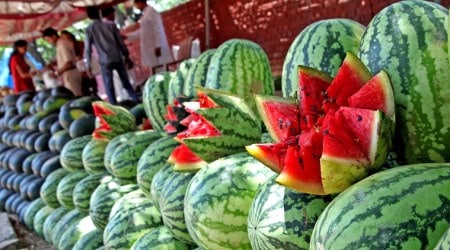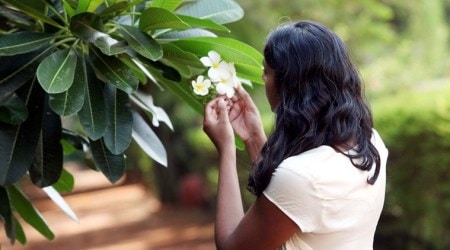 In reality, what I took from my grandfathers was not what gave them their identity, but what could give me mine. (Illustration: Subrata Dhar)
In reality, what I took from my grandfathers was not what gave them their identity, but what could give me mine. (Illustration: Subrata Dhar)
There was once an elephant that loved dosas. Dressed in either a dhoti or a top hat-monocle outfit, this animal braved great dangers, such as a shortage of rice flour and stores running out of ghee, in its quest to eat every kind of dosa under the sun.
My paternal grandfather, whose name I embarrassingly mangled to Danduppa as a child, is without a doubt the worst storyteller I have ever had the misfortune of listening to. Celebrated Tamil writer he may be, but the elephant story was the pinnacle of his oral narrative skills. And I, the six-year-old, had been responsible for much of the actual plot. I believe he would have been content to simply wax eloquent — through the voice of the protagonist — about why sambhar and coconut chutney made for the perfect accompaniments for dosas.
My maternal grandfather, who received the somewhat more traditional nickname of Kumar Thatha, was, in many ways, the polar opposite. He was a man of fervent faith, leaning towards conservative beliefs in an old and very traditional part of Chennai. He was a government employee, working at the docks in Chennai. My memories of summer often involved us visiting a temple or 10 in the area, with me putting up with the visits solely because of the treasure at the end of the rainbow — the prasad.
I can think of no circumstance other than the marriage of my parents that could have brought two such different people — and their corresponding families — in such close proximity. This showed in the dynamics of my family —a rich, confusing, often discordant, atmosphere that kept me on my toes constantly, in a search for equilibrium.
Kumar Thatha had been a harsh but loving parent in his youth, struggling to provide for his three children, and determined to see them succeed. My mother was fond of telling me stories about how, during particularly bad monsoons, the lane they lived in would be so flooded that she could not walk to school. Kumar Thatha would carry her and her siblings on his shoulders, wading through nearly shoulder-level water to a more elevated area. Of course, the moral of that particular story was: “Don’t make a fuss and get on the school van. At least you have a van!”
By the time my brother and I started waddling across his house, time had mellowed him, making him the doting grandfather we always knew him to be. Walking around the house with a slight limp, he would always be ready to countermand dentists across the world by sneaking us a few extra pieces of karkandu (sugar crystals), so long as we also stayed for the pujas. In time, he also became a constant supporter and editor, ready with pen in hand every time I tried writing something for a competition, a local publication or a children’s magazine.
About two years ago, Kumar Thatha was diagnosed with Parkinson’s disease. He and I had shared a tumultuous relationship for a large portion of my teenage years. I had plenty of teething issues when it came to forming my own set of beliefs, caught as I was between polarities. “What’s the point of worshipping so many imaginary deities? If prayer actually worked, wouldn’t the world be a much happier place? How do you know your religion is right and all the other religions are wrong? So some kind of cosmic boar lifted the Earth out of water? Doesn’t Christianity sound like a much better option?” were but a few of the questions I put to him through the years.
We had long talks, many of them on the way to or at various temples, and, for the first couple of years, both of us would lose our tempers and walk away, stubbornly convinced that the other person would never understand.
Danduppa, on the other hand, was a man of few words. He and my grandmother would spend six months in India and six months abroad, dividing their time between my father and my two aunts in the US. When in Kanyakumari, he spent much of his free time in his study, a small room of which one wall, facing the interior of the house, was made of glass and curtained. There he would turn inwards for hours every day, writing or re-drafting or simply thinking as he sat in a chair with wheels — a novelty at the time — near his bed.
When I entered, he would smile before placing his stick-thin legs on the bed, creating a makeshift plank on which I would promptly lie down.
“Do you want me to tell you a story?” he would ask.
“No! I’m so bored of that story! How are you a writer if you can’t even think of another one?” I would exclaim.
He would chuckle, I would giggle, and he would go back to his work. I would simply lie there for some time, or pretend to read a manuscript. It was a little bubble of reality, cut off from the rest of the noisy household, with the occasional whiff of filter coffee or the sudden sizzle of a dosa cooking on the stove (an inevitable presence at our table) the only intruders into that space. This became somewhat of a ritual till he passed away in 2005.
I know almost nothing of Danduppa, which meant I had to construct an image of him. There were plenty of blanks to fill in, and I did so, liberally idealising him in the process.
A year before he died, he told my father and grandmother that he didn’t want any caste-specific rituals at his funeral, only the ones common to all cremations. He could be termed a left-liberal agnostic, influenced by Marxist philosophies, though he grew disillusioned with the movement at the time. He had a wicked and pointed sense of humour, with an inclination for both irony and satire, which often manifested in his writing. I know he supported and helped marginalised voices in the literary community be heard. I have notes he scribbled in the corners of pages in his books, and fragments of conversations he had with his friends.
But none of this is the same as knowing him, arguing with him, debating with him, discovering his flaws.
Both of my grandfathers cast long shadows. One by virtue of his faith, the other with his writing. In Chennai, nearly every priest within a reasonable radius of my grandparents’ house knew Kumar Thatha, and was on friendly terms with him. Many of them saw in me a mini him, ready to take up his faith as my own without question. In Kanyakumari, where we often hosted friends and well-wishers, many of them would ask me when I too would enter the field of Tamil literature.
“Right away. Except I’m going to make it all English,” I would quip, if only to watch the look of shock and confusion that often followed.
In reality, what I took from my grandfathers was not what gave them their identity, but what could give me mine. My conversations with Kumar Thatha taught me the importance of dialogue, and that it was more than possible to love someone and not always agree with them. From Danduppa I retain a love for literature, for comfortable silences, and a never-ending desire for a crispy dosa.

